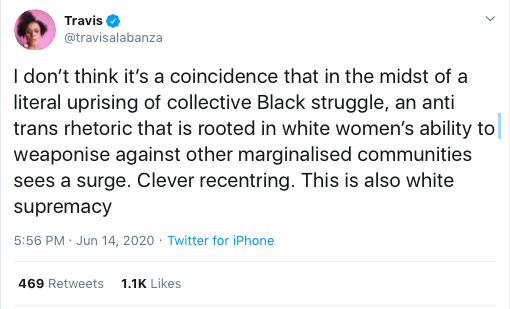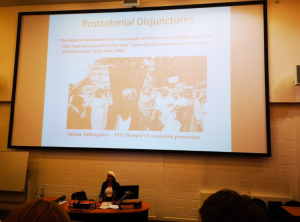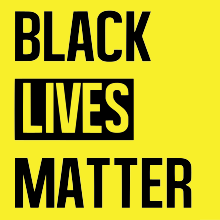On 25th May 2020, George Floyd was murdered by a white Minneapolis police officer who kneeled on his neck for a total of nearly nine minutes. The video of Floyd’s death, bravely captured by 17-year-old Darnella Frazier, went viral causing collective outrage and sparking a new wave of #BlackLivesMatter protests around the world.
In this blog, we collate the links and resources that the Gender and Education Association have been sharing on our social media feeds in order to signpost to some of the issues the #BlackLivesMatter movement highlights and signal boost some key voices.
Black Lives Matter is an international civil rights movement campaigning against violence and systemic racism towards black people. Following the acquittal of George Zimmerman for the fatal shooting of 17-year-old Trayvon Martin in 2013, #BlackLivesMatter was co-founded as an online campaign by Alicia Garza, Patrisse Khan-Cullors and Opal Tometi. In 2014, the first street demonstrations took place in Ferguson after the fatal shooting of 18-year-old Michael Brown by a police officer. Following this, BLM has organised thousands of protests and demonstrations speaking out against police brutality and police killings of Black people.
It is no coincidence that the current uprisings against systemic racism and police violence are occurring at a time when the global covid-19 pandemic is disproportionately affecting people of colour. Professor Akwugo Emejulu observes that ‘Black and Brown Americans are disproportionately sickened and have died from a novel coronavirus that exploits America’s breathtaking racial inequalities in health, housing and employment’. Similarly, in the UK coronavirus has highlighted long-standing racial health inequalities. Furthermore, data shows that Black people were more than twice as likely to be fined for lockdown breaches than white people in London.
#sayhername #blacktranslivesmatter #blackqueerlivesmatter #blackdisabledlivesmatter
#BlackLivesMatter was co-founded by feminist and queer black women. It has always affirmed ‘the lives of Black queer and trans folks, disabled folks, undocumented folks, folks with records, women, and all Black lives along the gender spectrum’. The global uprisings sparked by George Floyd’s death have, however, renewed discussions about whose deaths are rallied around and whose deaths are marginalised.
The recent kilings of Tony McDade, Riah Milton and Dominique “Rem’mie” Fells highlight how trans people of colour are at increased risk of fatal violence. Campaigners have called for more to be done to affirm that #BlackTransLivesMatter. On the 14th June, thousands gathered for a Black Trans Lives Matter rally in Brooklyn, New York. Over the same weekend, the US rolled back transgender health care protections and the UK government announced that it was scrapping plans to reform the Gender Recognition Act.

Many have also questioned why black women and girls remain an afterthought in mobilized outrage against police violence, noting that the fatal police shooting of Breonna Taylor in March 2020 did not receive widespread attention until after Floyd’s death. To date, there have been no arrests for Breonna Taylor’s death and only one of the police officers involved has been fired. The need to call attention to black women’s experiences of police violence necessitated the creation of the #SayHerName campaign in 2015. Following the death of Sandra Bland in police custody, the African American Policy Forum released the #SayHerName report to draw attention to the forms of police brutality disproportionately experienced by women of colour.
Professor Brittney Cooper also highlights how Darnella Frazier, who ‘bore witness to the extralegal killing of a Black man, and made sure the world heard the story’, was subject to online harassment for not intervening as four police officers restrained George Floyd. She compares this to the experience of Rachel Jeantel, a key witness in the Trayvon Martin case, who was subject to derision and harassment due to her speech impediment.
Campaigners have also highlighted the intersection of disability and race in police brutality cases noting the disproportionate impact of state violence on Black people with disabilities. Given the number of police killings of people in mental health crisis, campaigners have called for a re-direction of funds from police budgets towards unarmed mental health response teams.
The recent protests have intensified demands to defund the police and consider different modes of public safety. For decades, abolitionist feminists such as Angela Davis and Alice Walker have been calling on us to re-imagine what justice can look like and highlighted the harm caused by the prison industrial complex. Movements to defund the police illustrate the limits of reforming institutions that are rooted in the history of slavery and colonialism.
Black Queer activists have also renewed their calls for an end to police presence at Pride marches. Stonewall was a riot against policy brutality led by trans women of colour and homeless queer youth. It marked a turning point in the fight for LGBTQ+ rights and inspired the first Pride marches. In recent decades, however, Pride marches have become increasingly commercialised and welcoming to the police. At last year’s London Pride, the police and officials tried to stop Lesbians and Gays Support the Migrants, the Outside Project and African Rainbow Family from marching but did not intervene when an anti-trans group hijacked the parade.
Racism is still rife within LGBTQ+ communities and queer spaces leaving many black LGBTQ+ people feeling marginalized and unsupported. This necessitated the creation of UK Black Pride in 2007 despite opposition from mainstream LGBTQ+ organisations. It is Europe’s largest celebration for LGBTQ+ people of African, Asian, Caribbean, Middle Eastern and Latin American descent and advocates all year round for the health and wellbeing of these communities.
Over the last few weeks, thousands of academics have been sharing their experiences of anti-black hostility in higher education under the hashtag #BlackInTheIvory. The hashtag was started by Dr. Shardé Davis and doctoral student Joy Melody Woods who wanted to share their experiences of racism in academia. Many have noted how the hashtag is limited to those who feel safe enough to share (some) stories without fearing repercussion.
In the UK, there are currently only 40 Black female professors and just 4,140 Black academics compared to 165,765 white academics. Leading Routes, an initiative to prepare the next generation of Black academics in the UK, note that over a three-year period just 1.2% of the 19,868 studentships awarded by all UKRI research councils went to Black or Black Mixed students. They have been re-sharing findings from their report ‘The Broken Pipeline – Barriers to Black PhD Students Accessing Research Council Funding’.

Last year’s #GEAconf2019 featured keynote addresses from Professor Kalwant Bhopal and Professor Heidi Safia Mirza whose work addresses issues of racism, sexism and white privilege in higher education. You can see further information about the #GEAconf2019 keynotes and panels here.
In the UK, the #BlackLivesMatter protests have also revived demands for a national curriculum that includes Black lived experiences and contributions throughout history.
The toppling of the statue of slave trader Edward Colston in Bristol spotlighted the racist construction of British history and the educational function of public monuments. Watch Bristol-based poet Vanessa Kisuule’s response to the statue’s removal and read Travis Alabanza’s words on what it meant to them as a young person who grew up Black and queer in Bristol.
Calls to remove Colston’s statue had been made for decades, and so too have calls to revise the national curriculum. In 1999, The MacPherson Report recommended that a more culturally diverse curriculum was key to challenging racism. More than twenty years later, The Windrush Lessons Learned Review highlighted yet again the need for migration and colonial history to be taught on the curriculum.
GEA has featured a range of work on transforming school cultures from the bottom up. GEA Executive Member Dr. Victoria Showunmi’s research, for example, addresses how teachers and schools can begin to address barriers to young Black girls’ education by looking at the role of the Black Girls’ Club in challenging the status quo for young girls of colour. GEA members have also explored how to activate intersectional feminist change, showcase sisterhood amongst adolescent girls of colour and support young people to speak out in their schools and communities. Until Black British History is part of the national curriculum, schools will have limited time, resources and training to ensure that it gets the attention it deserves.
Resources
The Broken Pipeline: Barriers to Black PhD Students Accessing Research Council Funding – Leading Routes
Racism in secondary schools – The Runnymede Trust
About Race Podcast – Renni Eddo-Lodge
Feminism, Interrupted – Lola Olufemi
When They Call You a Terrorist: A Black Lives Matter Memoir – Patrisse Khan-Cullors
A feminist and queer syllabus for black liberation – Autostraddle
Prison Abolition 101 – Community Action on Prison Expansion
Say Her Name – The African American Policy Forum
Organisations


